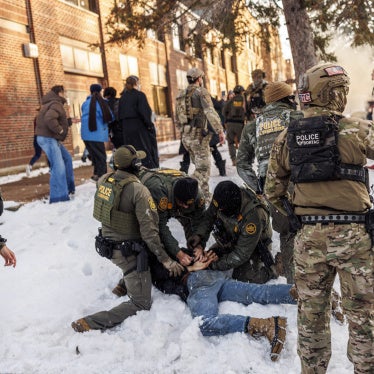He hasn't managed to bring peace to the Middle East, and he won't be appointing any more Supreme Court justices in the next few weeks. But President Clinton still has a chance to shape his legacy: He can bring hope and justice to the lives of millions of people all over the world, decades after he leaves office, by signing the treaty for an international criminal court before the deadline Sunday.
The international criminal court is the biggest thing to happen in human rights in 50 years. The court will prosecute people suspected of committing the worst atrocities known to mankind: genocide, crimes against humanity and war crimes. Without such a court, we have nowhere to deposit the tyrants and tin-pot rebel leaders who commit these terrible deeds.
Just one example: Six months ago, the government of Sierra Leone finally captured the rebel leader, Foday Sankoh, whose troops have been killing, raping and cutting off the limbs of civilians in that West African country for the past 10 years. But now that they have him, what can they do with him? After a decade of civil war, the Sierra Leonean judicial system is, to say the least, a shambles. So the past half year has been spent wrangling at the United Nations about the makeup and jurisdiction of a special tribunal -- which is still not off the ground.
Meanwhile, the rebels in Sierra Leone are bargaining to lay down their weapons only if their leader is released from prison -- a pact with the devil if there ever was one.
Court simplifies things
How much simpler it would be to have an international court with judges and prosecutors at the ready, where people such as this rebel leader routinely could be handed over. That's the only way to return a failed country such as Sierra Leone to normalcy: a sober judicial proceeding in which the crimes of the past are laid out, addressed and punished.
The international court will be established in less than two years. Already, 122 governments have signed the treaty for the court, and 25 have ratified it. Sixty ratifications are needed.
The United States stands almost alone in opposing this process. Virtually every single one of its democratic allies, including all of Western Europe, vigorously supports the court. Court opponents such as Sen. Jesse Helms, R-N.C., simply mistrust international institutions that put any obligations on the United States. The Pentagon has legitimate worries that as the world's sole remaining superpower, the United States could become the target of frivolous international lawsuits. But the court has been designed to preclude politically motivated trials.
Any citizen charged with genocide or other serious crimes would not come before the court unless his own government had completely failed to investigate the case. That hardly describes the U.S. system of justice. The international criminal court is designed for the dysfunctional Sierra Leones of this world, not for the United States.
Some Senate opposition
Despite the court's many safeguards and protections for American citizens, some U.S. lawmakers have said they'll never allow it to be ratified in the Senate, which must approve the treaty.
And after Sunday, any country that wants to join the court has to ratify it straight away. So Clinton has a very small window of opportunity to do the right thing. If he signs the treaty by Sunday, he will lend American prestige and expertise to the fledgling court.
If he lets the deadline pass, the court will go ahead without U.S. support -- and the president will have allowed the forces of short- sightedness and expediency to hold sway over his final days in office.
That's not much of a legacy for history. Just ask the people of Sierra Leone.








